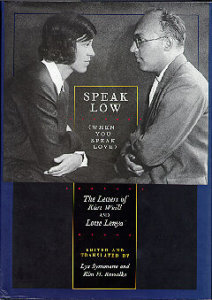
New York Times Notable Book of 1996
Financial Times Book of the Year Selection, 1996
Available in paperback from U. Cal Press, November 1997
Speak Low (When You Speak Love)
The Letters of Kurt Weill and Lotte Lenya
Edited and translated from the German by Lys Symonette and Kim H. Kowalke

Published by the University of California Press
554 pages, 98 b&w illustrations
ISBN 0-520-07853-5 (cloth) / 0-520-21240-1 (paper)
$39.95 (cloth) / $24.95 (paper)
From the catalog . . .
Fiercely independent and yet codependent, Weill and Lenya spent twenty-five years discovering a way to live together after discovering that they couldn’t live apart. Weill gave music to her voice, Lenya gave voice to his music. Their correspondence–first in German and later, after their move to America, in highly flavored English–is uninhibited, intimate, and irreverent. It offers a backstage view of German music and theater, the American musical theater in the late thirties and forties, and Hollywood. The letters are candid, vivid commentaries on world events, the creative process, and the experience of exile.
Never before published, this collection reflects the vibrancy of Weimar culture in the Golden Twenties and the vitality that émigrés brought to American culture. Lenya’s unfinished autobiographical account of her life before Weill is also included, along with a prologue, epilogue, and connective commentary. Immensely touching as well as informative, Weill and Lenya’s letters preserve a portrait of a memorable love that somehow survived its turbulent surroundings.
Advance notices . . .
Ned Rorem: “These letters are intimate without sentimentality, intelligent without literary pose, gossipy without slander, informedly opinionated without deviousness, and businesslike without toughness. I deeply admire the skillfully caring annotational glue provided by the editors.”
Harold Prince: “Because Weill and Lenya were ardent and explicit letter writers and seem to have met everyone working in music and theater, there are fascinating insights into the lives of the masters of the first half of this century. . . Speak Low was impossible to put down.”
Teresa Stratas: “One day near the end Lenya looked at me with those searing eyes and confessed, ‘I’ve always envied you because you were able to sing Lulu.’ I countered, ‘But Lenya, you are Lulu.’ And now that her revealing autobiographical fragment and these gripping letters are published, her portrait emerges in colors as vivid as Lulu’s. Lenya and Weill remain unique and essential for the art of our time.”
German Edition
Under the title Sprich leise, wenn du Liebe sagst, Kiepenheuer & Witsch of Köln published the German edition of the Weill-Lenya correspondence in 1998. For the first time, the letters written in German are available in their original language, while the English letters, notes, and commentary have been translated by the editors, Lys Symonette and Kim H. Kowalke. The German edition incorporates corrections and new information brought to light after the publication of the English edition in 1996. The cover design matches that of the English version. ISBN: 3462027484.
Selected Reviews
John Simon in New York Times Book Review, 23 June 1996: “[T]heir scrupulously presented correspondence sheds considerable new light on them and the many people in show business and elsewhere they came in contact with. . . . Speak Low . . . speaks loud and clear. The editors have not only superbly annotated the letters, often tracking down remote references and allusions; they have also provided concise yet far-ranging bridges and commentaries. . . . [P]ossibly the best-edited correspondence I have ever read. Taken together, the letters and the sundry additions constitute a first-rate joint biography of this fascinating couple. To put it bluntly, the critical apparatus is often more interesting than the text. That is not to say the letters are small potatoes. They offer a vivid evocation of the musical, theatrical and cinematic worlds of Berlin, Vienna, Paris and London . . . Broadway and Hollywood, with a charming sidelight on New City, N.Y. . . . [A]n action-packed tribute to a marriage of sometimes untrue bodies, but always true minds.”
William Hyland in Civilization, May/June 1996: “This volume is virtually a self-contained dual biography.”
Erik Levi in BBC Music Magazine, April 1996: “This book represents something of a milestone in Weill scholarship.”
Terry Teachout in Washington Post, 26 May 1996 (reprinted in International Herald Tribune, 7 June 1996): “[Kowalke and Symonette] have produced a volume of the highest possible importance for anyone interested in Kurt Weill’s music–and, not at all incidentally, an extraordinarily colorful narrative about two difficult people who needed each other very much, but never quite figured out how to get along. . . . Musically speaking, though, the most important thing about Speak Low is the way in which it dramatizes the continuity between Weill’s collaborations with Brecht and his later work for Broadway. . . . Symonette and Kowalke have linked the 393 letters in this volume with extensive yet readable notes that make it possible to read Speak Low straight through, just like a good biography. . . . All in all, I can’t think of a better-edited volume of musical letters, or a more entertaining one.”
Judith Malina in Opera News, June 1996: “Often written in lovers’ codes, the letters are nonetheless a revelatory portrait of artists joined in a Davidian battle with the Philistine giant of show business. . . . When we find ourselves humming the tunes these two pioneering artists have put in our heads, we might well remember what it takes.”
The Atlantic Monthly, June 1996: “The correspondence is gossipy and often maliciously clever about colleagues, exasperated about failed projects, and in Lenya’s case highly informative about the miseries endured by a road company playing in the sticks. . . . Both enjoyed love affairs during their periods of separation, and both took it calmly, Weill once writing, ‘I believe we’re the only married couple without problems.’ . . . As one works through their well-annotated correspondence, they become very likable people.”
Michael Phillips in San Diego Union-Tribune, 30 May 1996: “The book is compulsively readable. Yet for all its gossipy, celebrity-ridden pleasures, Speak Low transcends the gossip level. . . . The work-related correspondence–which is almost never merely work–turns up heartbreaking details on unfinished project after project, near-miss after near-miss. . . Graced with an exceptionally eloquent introduction, supplemented charmingly by a glossary of pet names and expressions (everything from ‘Doofi’ to ‘Mistblume,’ or ‘Dungblossom’), Speak Low speaks volumes about two voluminous lives.”


